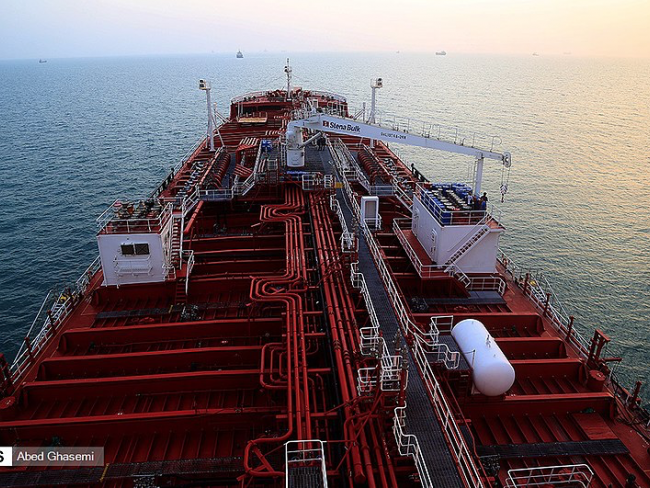30 July 2019

Image released by Iran of the seized tanker Stena Impero. Photo Fars News Agency (CC BY 4.0)
After an initial bout of sabre-rattling over the seizure of the British-registered Stena Impero by Iran, in apparent retaliation for Gibraltar's seizure of an Iranian tanker (now released), things have gone quiet.
Jeremy Hunt, then Foreign Secretary, called the seizure an “act of state piracy”, conveniently omitting to mention the seizure of the Iranian supertanker Grace 1 in Gibraltar 16 days earlier in an inexcusable obeisance to EU sanctions on Syria.
Hunt is no longer Foreign Secretary, so he has few sabres to rattle. And the Stena Impero’s owners are clearly trying to calm things down.
But one reason for the return of (relative) calm is that there are no British crew, so interest by the UK media is difficult to sustain in the absence of any real movement on the diplomatic front. And no British owner, either, since Stena is owned by the three Swedish children of its founder, Sten Allan Olsson
But how come a “British” vessel operating in the Gulf is owned by a Swedish company and operated by a crew none of whom are British? Part of the answer lies in Britain’s membership of the EU.
Maastricht
After the Maastricht Treaty, which came into force in 1993, the UK government modified the shipping regulations to allow EU (at the time EC, European Community) nationals established in the UK, and EU-based companies with a place of business in the UK, to register their ships here.
Previous legislation, based on the Merchant Shipping Act of 1854, had specified that only British subjects and companies whose principal place of business was in the UK could register ships as British.
In 1995 the government went a step further, changing regulations that had been in place since 1919 to allow the positions of Master, Chief Officer and Chief Engineer on British-flagged ships to be held by people of any nationality as long they held a UK certificate of competency or equivalent.
Suffice it to say, these changes, introduced by the Conservative government of John Major, were neither repealed nor challenged in the subsequent 13 years of Labour rule.
The changes were in fact never even debated on the floor of parliament. But their effect has been far-reaching: registering a vessel in the UK allows ship owners to escape virtually any controls over the nationality of seafarers working on it.
‘Flexibility’
Or as the UK Ship Register puts it, “UK has minimal seafarer nationality restrictions giving companies flexibility in whom they employ provided they have a Certification of Competency issued by one of the 49 Administrations, that are accepted by the UK.”
These administrations cover most of the world’s population – including China, India, Pakistan, Indonesia, Russia, the United States and Brazil. And, ironically, Iran. And helpfully for the ship owners, UK registration allows “flexible manning levels” for so-called hot (short-term) and cold (longer-term) lay-ups.
So registering a ship in the UK gives ship owners a global choice of seafarers. The 23 crew of the Stena Impero demonstrate this: they come from India, the Philippines, Russia, Latvia…anywhere but Britain.
The 1854 act had a provision to deal with ships pretending to be British that weren’t: “If a person uses the British flag and assumes the British national character on board a ship owned in whole or in part by any persons not qualified to own a British ship, for the purpose of making the ship appear to be a British ship, the ship shall be subject to forfeiture…”
Perhaps that’s what the Iranians had been reading when they stopped the Swedish-owned, non-British-crewed Stena Impero.
Even more foreign owners
In May this year the UK Ship Register was opened up to even more foreign-owned and -operated ships (or as the Register put it, “Outstanding shipowners from across the globe now have access [to the register].)” The 20 extra countries include China, the US, Israel, Japan and Switzerland.
Also last year, the government announced its ambition to double the size of the UK fleet, citing one of the benefits of the British flag as the protection of the Royal Navy. Given that the Navy has been hard pressed even to find a frigate to escort ships in the Gulf, that protection might not be all that impressive.
And rather than indulge in imperialist fantasies of gunboats bringing troublesome regimes to heel, the government will be needing the few warships it has to protect Britain’s fishing grounds after Brexit.
• Update: this article was updated to take account of Gibraltar’s release of the Iranian tanker on 15 August 2019.
